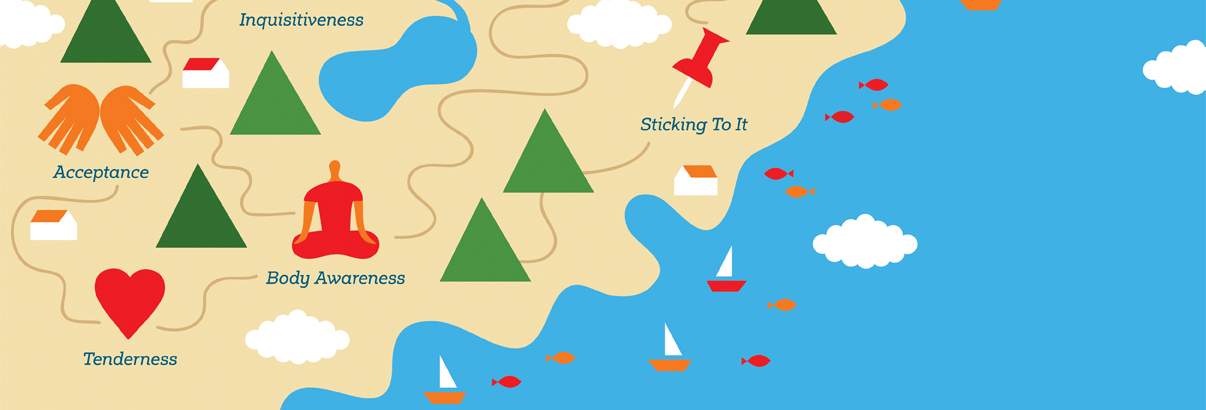It was about a dozen years ago and I was going through a rough bout of depression. I convinced myself there must be some ready cure I could find, and I embarked on a frantic tour of the therapeutic merry-go-round to relieve my pain. I desperately reached for any doctor, therapist, or support group. I gobbled up whatever advice or pills they offered, but nothing changed. I was still in pain.
Eventually I came to mindfulness. At first, I approached it with the same demand for instant relief. But then something unexpected happened. I saw that it was impossible to really follow the instructions for mindfulness meditation—gently paying attention to the flow of breath, allowing things to be just as they are—and strive for results at the same time. So I stopped looking for cures and results, and to my surprise, some helpful openness and clarity began to arise in my mind. I came to know my depression differently. I began to notice its textures and contours, its causes and its effects. I became familiar with its landscape.
As I continued to meditate over the following months, my stressful struggle to fix and change things faded little by little.
The difference was this: now I could observe my thoughts and feelings without identifying with them so much. As I continued to meditate over the following months, my stressful struggle to fix and change things faded little by little. A subtle and profound transformation occurred as I allowed myself to rest in the experience of just being. I became more willing to experience all the energy of my emotions and feelings—even the unpleasant ones. I stopped fighting with myself so much, and with that, ironically, came the very relief I was seeking.
Mindfulness these days is strongly associated with stress reduction, and for very good reasons. Mindfulness reduces stress. Full stop. Reducing stress is a great goal. Another full stop.
But mindfulness practice can be so much more than stress reduction. Certainly I am less anxious and stressed today than I was a decade ago. But my difficulties haven’t gone away, and neither have my habitual ways of reacting to them. And yet things are better. From what I have seen in myself—and the people I teach mindfulness to—the biggest changes come from letting go of our goals, struggles, and hopes for a cure. At a certain point, focusing our mindfulness practice too much on stress reduction—or any goal—can limit its benefit to us. Real change comes from learning to make a different relationship with our stresses and difficulties.
As I discovered during my early days of practice, mindfulness meditation has built-in mechanisms that free us from the trap of instant salvation. Our goal-oriented mind-set is deeply ingrained and persistent, and we need all the help we can get to reorient ourselves to a new way of being—so that we are less eager to run away from where we are in the moment.
That’s why it is helpful to settle in for the mindfulness journey, so we can appreciate its rich view and interesting ride, even—especially—when it doesn’t seem beautiful or smooth. The formal practice of meditation helps us navigate the route, and so do the attitudes we take as we travel. By gently cultivating certain qualities, we create the conditions for a shift in perspective, so in time our goals may no longer seem that relevant, even when, as if by magic, they are achieved. Here are seven qualities we can cultivate in our mindfulness practice that will bring benefit to ourselves and others.

Acceptance
Like any skill, mindfulness needs effort. But many of us have been told—or tell ourselves—that we don’t try hard enough, haven’t got it in us, or fail because we’re lazy. So we may try too hard, thinking we have to do everything perfectly.
This makes the whole business of effort a bit tricky. The commitment we cultivate in mindfulness practice is nonjudgmental. We’re loyal to the present moment, which takes the form of a willingness to gently come back from distraction again and again. It also includes compassionate acceptance when our mind wanders off.
When we notice how we judge ourselves for not being good enough, or our meditation for “not working,” it helps to remember that each moment starts fresh. We are never damned; we can renew our commitment in every moment. In fact, every time we notice distraction, we have already come back to awareness. Noticing our distraction is a cause for celebration, not recrimination.
How?
It’s helpful to plan a time and space to practice regular meditation and stick with that plan. Make a commitment that feels manageable. Notice if you’re driving yourself too hard or selling yourself short. Let go of these thoughts.

Tenderness
Many forms of training focus on getting us “in shape.” Mindfulness is different. By letting go of pushing, pulling, remonstrating, and ruminating, we go easier on ourselves. If we feel sad, we can allow that sadness. If we feel judgmental, we can allow for that without having to buy into it (or judge ourselves for being judgmental). If we feel angry, instead of seeing it as a solid unchangeable mass, we can see that it comes and goes a little. There are actually spaces in the midst of the intensity. That’s why it can still be possible to make someone laugh even when they’re angry.
Mindfulness means “to pay attention.” But this can carry connotations of harshness— the critical schoolteacher or bellowing drill sergeant—so it helps to remember that paying attention in this case really means “to tend,” to care for something in a warm and supportive way. We can become our own kind parent, nurturing ourselves with unconditional caring. Then the challenges of life won’t hit us quite so hard.
How?
Practice opening to parts of yourself you’d rather reject. Notice how they respond to compassion rather than condemnation.
Inquisitiveness
Taking what some psychologists call an “approach” mentality to life is a key marker of well-being: being curious about the world, interested in new people and experiences, even when they scare us. Avoidance, by contrast, means letting fear control us, not going to new places, trying new activities, or exploring ideas that don’t fit our existing mind-set.
Mindfulness—noticing events in a warm, open, and inquisitive manner—develops the courage to meet our lives with genuine interest. It doesn’t mean there’s no discomfort when we dare to be curious. It means we’re willing to tolerate not knowing what might be around the next corner. In return, we experience the delight of being able to look, listen, taste, touch, feel, and learn from our environment. We may not know all the answers, but we don’t limit our perspective.
How?
Be a scientist in the laboratory of your world. Pause before making assumptions. Hear the feedback from your mind, body, environment, and other people. Give those around you space to express their views, especially if they are different from your own. Can you walk in their shoes for a moment, seeing from their perspective? Ask yourself: “What’s actually going on here?” and be open to the information that comes back.

Body Awareness
Where is your mind? Most of us point to our head. The word mindfulness can suggest cognition—something to do with thinking and the brain. But mindfulness means bringing awareness to our whole experience, not just from the neck up. By acknowledging our bodies in meditation, we synchronize mind and body and experience ourselves as an integrated whole. When we experience an emotion, we notice how it feels in different parts of our body. That helps when it comes to acting on our feelings. Dismissing our feelings leads us to live out of step with our hearts, and by increasing our body awareness, we have a chance to redress this imbalance.
How?
Slowly scan your body from toe to head, noticing each part and where the tension lies. A practice like this tunes you into the pulses and rhythms of your body a little more. Long-distance runners do this to be aware of how different parts of their body are responding to the effort they’re expending. In everyday life, pausing several times a day to feel what’s going on in our bodies can free us from being caught up in the speed and importance of our thoughts.

Appreciation
It’s easy to focus on the negative too much. On the other hand, self-help-style positive thinking can end up as a superficial pep talk. In contrast, simple appreciation means taking a bit more time to allow things to be just the way they are, without wanting them to change so much to suit us. If someone is being cold toward us, we see that for what it is, without trying to push it away too hard or sugarcoat it.
With this kind of attitude, we can appreciate beauty, warmth, friendship, and joy, but also sadness and anger, loss and illness, difficulty and disappointment. It may go against our conditioning, but in embracing what’s difficult we hold the key to not letting negative thoughts overwhelm us. Pushing them away just fuels their power.
How?
Sit up and take an uplifted, open, and relaxed posture. Even that little gesture of not slumping and shirking helps us embrace life with more equanimity. We can savor the good things and meet our problems without trying so hard to get rid of, fight, or deny them. What would happen if we cracked a smile when we were depressed? It’s not just a way to grin and bear it but a step toward appreciating the inevitable ups and downs of existence.

Being Generous
Every act of mindfulness contains a bit of generosity already. When we choose to escort our wandering attention home, it’s as if we’re reaching out a hand to a child who is lost in a crowd and struggling to get to the safety of their parents.
We start by lending a hand to ourselves. After giving the gift to ourselves of letting our emotions come and go without being so harsh about it, we can start to become more generous with others and their states of mind. As we become less caught up in our own little dramas, we discover that other people, with their own struggles and challenges, are really not so different from us. We start giving them the room to be themselves.
How?
Meditation is most beneficial when it’s not just a solo sport. See if you can find some other people to practice meditation with, people with whom you can share the experience of being more open and the challenges that can go along with that. Openness can be contagious, and the tendency to hold back from being free and generous with others can be worn away.

Sticking to it
The mindfulness road can be rocky. It takes guts to return again and again to the present moment, especially when our impulse is to run away, attack, or hide. And we will regularly fail.
When the novelty has worn off, when we’re doing the spadework of meditation and what we excavate is smelly, dark, irritating, boring, or frightening, this is a chance to work on being steadfast. Can we trust that the plummeting self-esteem we’re feeling right now is okay? Can we patiently let our thoughts and emotions run their course? Can we return to the now when it’s not where we’d like it to be? Can we return to our mindfulness when our minds aren’t calm and we feel like we’re getting nowhere? The reward for sticking to it is the deeper confidence that develops—the feeling in our bones that we can handle whatever life throws our way.
How?
Using breath as an anchor, we can be with whatever presents itself. Knowing that this moment is already here—and that the only sensible thing is to be with it—we can ride the waves of difficulty with dignity and poise, like a good rider on a spirited horse. We can still seek the support we need, make changes we need to make, or let someone know they need to stop hurting us. In doing so, though, we use the wisdom of mindfulness as our guide, drawing on deep inner resources to negotiate the journey with gentleness and skill.









